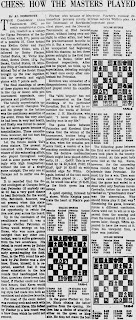New York Times, New York, New York, Sunday, July 08, 1962 - Page 80
Chess: How The Masters Played
The Candidates' Chess Tournament 1962, recently completed at Curacao, resulted in a victory for Tigran Petrosian of the Soviet Union with 17½ points out of a possible 27. Close behind was Ewfim Geller and Paul Keres of the Soviet Union, with 17, followed by Bobby Fischer, United States, 14; Victor Korchnoi, Soviet Union, 13½; Pal Benko, United States, 12. Miroslav Filip of Czechoslovakia and Mikhail Tal of the Soviet Union brought up the rear together, tied for seventh and eighth places with 7 points each.
The final standings of seven of these players was reasonably in line (up or down) with pre-tournament appraisals, comparisons and predictions.
The totally unpredictable upset of ex-world champion Tal and his plunge to the bottom was the continuous sensation of the event. From the very start he had been in very bad health, and finally was forced to cancel his last seven games because of hospitalization. These cancellations, however, did not hurt his score percentage-wise.
Let the future decide Tal's chess stature. The present is concerned with Petrosian, the winner of this exhausting affair, who played throughout coolly (and in some games very daringly with high imagination) without the loss of a single game outright. The only one at Curacao not to suffer one defeat.
It is reported that the Soviet contingent at Curacao feels that Petrosian (if anybody can do it) has a very good chance to beat Botvinnik for the world title.Botvinnik, however, was not present when this statement was made, but will have the opportunity to refute the idea next year across the board.
Up to the conclusion of the penultimate round it was a toss-up whether Petrosian or Keres would emerge on top. Keres, who won more games outright than any other contestant, was to suffer grievously from the two Americans. His defeat in round seven by Bobby Fischer, prevented him from early spread-eagling the field. Then, in the 27th round his setback by Pal Benko was a dire blow. Keres, himself, it is reported, asserted that it was sheer exhaustion in the late rounds that handicapped him. Most American chess-lovers had hoped, if Fischer could not take first honors, that Keres would do it. His personality and dashing style has made him both an emotional and objective favorite.
For most of the event Geller was running neck-and-neck with Petrosian and Keres. His defeat by Fischer in a late round was a blow from which he could not recover.
Fischer, who because of his immediate previous results in the Interzonal at Stockholm (first place), and the Memorial Tournament at Bled (second place), without losing once outright in either affair, had been the pre-tournament favorite to win it. But a very unfortunate, an unexpected bad beginning killed his chances; he lost three games outright in the first four rounds, to Benko, Geller and Korchnoi respectively. After this he played, we think, up to expectations, defeating outright at least once every other contestant but Petrosian.
Korchnoi was somewhat of a disappointment to his followers and played under his capabilities.
The “alibi brigade” has not yet commented on the final standings of its particular favorites. But it is well to remember the words of British master, J.H. Blackburne, who said: “I never won from a healthy man in my life.”.
The game below between Petrosian and Korchnoi illustrates that the winner of the tournament, besides being a positional stylist par excellence, is also, when the occasion presents itself, a master of far-reaching combinative sytle. Before the decisive combination Black might have played differently, 13 . . . QxRP. This is refuted by 14 Kt/3-Kt5, PxKt 15 KtxP, QxP 16 Kt-B7 ch with decided edge for White. Or again, instead of the text move, had Black played 14 . . . QxP ch he would lose after 15 K-R1, as the black queen has no escape.
A quiet opening, followed by a storm. White Knights penetrate the heart of a Black's position.
In the game Fischer vs. Geller, Black obtains the better position from the opening. He then has a choice of attacking either on the queen or king side. He does not make the best choice. Fischer's cunning defense outwits White's plan. An important game.
The following game between the first and second prize winners took place in the twenty-fifth round. At this point both were tied at the top. Keres, however, for the succeeding three rounds had the harder schedule than Petrosian. He must try for a win. Then soon the news came from Curacao that the game had ended in a draw after only fourteen moves.
Cynically, before the score had reached us, “grandmaster draw” was the observation. Why should Keres play it that way? Examining the game, however, forces a different conclusion. Keres went out to win as is apparent from the opening and from the unusual 8 P-B5. A few moves later, though, White appeared to have the worst of it. From his viewpoint then, a draw was justified.























